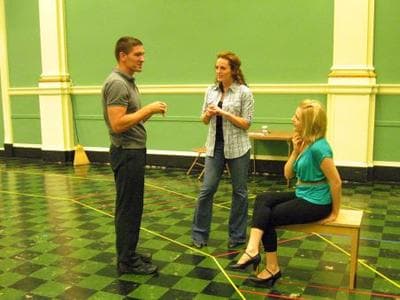Advertisement
The Show May Be Free, But Free Costs Money
ResumeThe Boston Landmarks Orchestra performs at the Hatch Shell every Wednesday night from now through September. Last week, hundreds of people laid claim to parcels of grass along the Charles River. They had picnics and pizzas, but no ticket stubs, because the concert is free.
"It's a great selling point," said 22-year-old Elizabeth Olson of Somerville, who came with her father. "It's made it a much easier decision to say, let's just go for a Wednesday evening. Otherwise we I think we probably would've shied away from it."
Rosalie Williams, who lives in Cambridge, agreed. She credits the economic downturn for her new-found enthusiasm over this free classical music series, and called it "a poor person's Tanglewood."
Free outdoor concerts, plays and films are plentiful, and popular, in Boston during the summer. Especially this summer. The price is right for people who've had to slash their entertainment budgets during the recession. But, as we all know, very few things in life are truly free. And the economic downturn is proving problematic for organizations that produce free entertainment.
The Boston Landmarks Orchestra stages a slew of outdoor concerts all over the city: in Jamaica Plain, Roxbury and Dorchester. That's its mission, says conductor Charles Ansbacher, who founded the group nine years ago. "The idea of doing free concerts in the parks is an American tradition, which we're very proud of and want to preserve," Ansbacher says, but, "of course there are expenses involved."
The orchestra's general manager, Virginia Hecker, concurred, saying, "I think the biggest misconception is that because it's free, it doesn't cost anything to put on the concerts."

Hecker is clear to point out that the musicians do not work for free. Their union pay is a big line item because they are some of the city's top professional freelance players. Donations and grants are down, so the orchestra has tightened its purse strings. Hecker trimmed marketing expenses and locked staff salaries.
They also decided to start the concert series one week later, in essence sacrificing a performance. One less concert for the orchestra was a tough decision, Hecker said, "because we want to have a presence."
But still, Hecker predicts an increase in attendance this summer because of the recession. And Wednesday's concert was packed.
Catherine Peterson of ArtsBoston says "on-the-house" entertainment is indeed in right now. Peterson knows this because she says the "free" category on her arts calendar Web site is experiencing a spike in traffic. ArtsBoston also sells discount theater tickets here, at the BosTix booth in Copley Square.
Peterson says it's crucial for all arts organizations, including museums and music schools, to keep up with their free programming during economic hard times. "It's a great way to engage people and to keep them part of the arts-going community and I think it's an investment in our community," she said. "So that, when the economy improves, people will be paying full price tickets, they'll be giving donations -- so it's smart and a good thing."
Peterson also warned that the funds supporting most of this summer's free events were raised at least a year ago, before the economy totally imploded. Next summer could be tragic for some arts organizations. In light of the depressing economic landscape, the Commonwealth Shakespeare Company is staging "The Comedy of Errors."
Steve Maler has been directing free Shakespeare on the Common productions for more than a decade and says it's definitely, "a summer for a comedy." The choice was also cost-effective, Maler says, because, "it's the shortest play in the cannon, so we felt like we could constrain our rehearsal window and not compromise artistic quality. It's a play that takes place in one location, so it doesn't require any moving scenic elements -- you build the set and then it stays there."
But that set costs $25,000. Security for the 17 performances is about $17,000. The portable toilets can be $5,000. The company's overall operating budget is $350,000. Cutting back has been tough, because, Maler says, you can only slash so much. "You can't get rid of security, obviously, you can't get rid of the lighting grid that illuminates the stage," he says. "So the focus really shifted from the expense side of the budget to the income side of the budget."
To generate income, an army of volunteers will solicit donations from people who come to see the free play. Maler said the company is doing whatever it takes, because the show must go on.
"Many of the actors are working for free," Maler admitted, "and they're doing it because they want to be part of this gift that we give every year to the city, and that's just too precious to let go. We can't just let these critical civic moments of our town crumble because of a rough patch that we're in financially."
And, for Maler, the bottom line with art is that plays and music make us feel less alone, and remind us who we are. In good times and bad.
